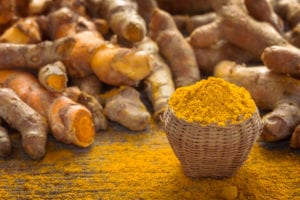Written by Greg Arnold, DC, CSCS. All three doses of curcumin (high, low, and combined low dose/ saffron) significantly reduced depression and anxiety in the participating patients with major depressive disorder; however, adding saffron to low-dose curcumin did not enhance its effectiveness.
 Curcumin, the primary antioxidant found in turmeric, has been used for medicinal purposes for centuries 1. It has shown wide-ranging health benefits, from 200 milligrams/day to improve blood vessel function 2 to 500 mg per day to help reduce liver fat 3. Now a 2017 study 4 suggests curcumin may be a benefit to mental health.
Curcumin, the primary antioxidant found in turmeric, has been used for medicinal purposes for centuries 1. It has shown wide-ranging health benefits, from 200 milligrams/day to improve blood vessel function 2 to 500 mg per day to help reduce liver fat 3. Now a 2017 study 4 suggests curcumin may be a benefit to mental health.
In a randomized, double-blind, placebo-controlled study, 123 (12 males, 101 females) between the ages of 40 and 46 were qualified to participate if they met the DSM-IV criteria for current major depressive disorder and had an Inventory of Depressive Symptomatology self-rated version (IDS-SR30) score ≥18. 5. They were allocated to one of the following four 12-week treatment groups:
- Low dose curcumin: 500 milligrams (250 mg twice daily = 28 subjects)
- High dose curcumin: 1,000 mg (500 mg twice daily = 33 subjects)
- Low dose curcumin with 30 mg saffron (15 mg twice daily = 26 subjects)
- Placebo (control group = 36 subjects)
At baseline and at 4, 8, and 12 weeks, subjects evaluated depressive symptoms using the self-rated Inventory of Depressive Symptomatology questionnaire and anxiety levels using the Spielberger State-Trait Anxiety Inventory 6.
The researchers noted the following results for depression:
| Depression | 4-weeks p-value | 8-weeks p-value | 12-weeks p-value |
|---|---|---|---|
| Low-dose curcumin | < 0.001 | < 0.05 | < 0.001 |
| High-dose curcumin | < 0.01 | < 0.01 | < 0.05 |
| Low-dose curcumin/saffron | < 0. 01 | 0.02 | < 0.01 |
| Placebo | < 0.01 | > 0.05 | > 0.05 |
| Anxiety | 4-weeks p-value | 8-weeks p-value | 12-weeks p-value |
|---|---|---|---|
| Low-dose curcumin | < 0.001 | < 0.05 | < 0.001 |
| High-dose curcumin | < 0.01 | < 0.01 | < 0.05 |
| Low-dose curcumin/saffron | < 0.01 | < 0.001 | < 0.001 |
| Placebo | < 0.01 | > 0.05 | > 0.05 |
While these study results demonstrate, at all three doses, curcumin’s ability to significantly reduce depression and anxiety in the participating patients with major depressive disorder, adding saffron to low-dose curcumin did not enhance curcumin’s effectiveness, nor did increasing the dose of curcumin. The authors suggest this may be the result of “inadequate power in the study to detect group differences, or perhaps a ceiling antidepressant effect of these natural spices.” Researchers believe all future studies on curcumin should take into consideration the quality and bioavailability of curcumin. In this study, researchers used a patented extract (BCM-95®) of curcumin, which has been shown to have increased bioavailability compared to standard curcumin or a curcumin/piperine combination 7. As well, they used a patented saffron extract (affron®) standardized for Lepticrosalides (a measure of bioactive compounds present in saffron, including safranal and crocin). Two self-reported questionnaires were used to assess levels of depression and anxiety and although they are considered reliable, the authors feel that using additional measures and clinician-rated instruments would have been desirable. They recommend that larger studies (100 or more study participants per group) are needed to validate these results.
Source: Lopresti, Adrian L., and Peter D. Drummond. “Efficacy of curcumin, and a saffron/curcumin combination for the treatment of major depression: A randomised, double-blind, placebo-controlled study.” Journal of affective disorders 207 (2017): 188-196.
0165-0327/ Crown Copyright © 2016 Published by Elsevier B.V. All rights reserved.
References:
- Institute LP. Curcumin. 2018; Overview of curcumin. Available at: http://lpi.oregonstate.edu/mic/dietary-factors/phytochemicals/curcumin. Accessed January 22, 2018, 2018.
- Oliver JM, Stoner L, Rowlands DS, et al. Novel Form of Curcumin Improves Endothelial Function in Young, Healthy Individuals: A Double-Blind Placebo Controlled Study. Journal of Nutrition and Metabolism. 2016;2016.
- Rahmani S, Asgary S, Askari G, et al. Treatment of Non‐alcoholic Fatty Liver Disease with Curcumin: A Randomized Placebo‐controlled Trial. Phytotherapy Research. 2016.
- Lopresti AL, Drummond PD. Efficacy of curcumin, and a saffron/curcumin combination for the treatment of major depression: A randomised, double-blind, placebo-controlled study. Journal of affective disorders. 2017;207:188-196.
- Rush AJ, Gullion CM, Basco MR, Jarrett RB, Trivedi MH. The inventory of depressive symptomatology (IDS): psychometric properties. Psychological medicine. 1996;26(3):477-486.
- Spielberger CD. State-Trait Anxiety Inventory: A Comprehensive Bibliography. Palo Alto, CA: Consulting Psychologists Press; 1983.
- Antony P, Diederich NJ, Krüger R, Balling R. The hallmarks of Parkinson’s disease. FEBS Journal. 2013;280(23):5981-5993.

